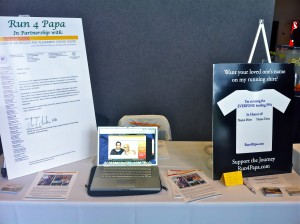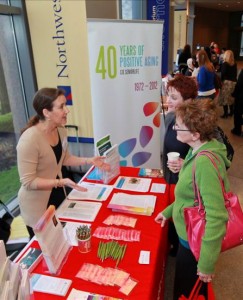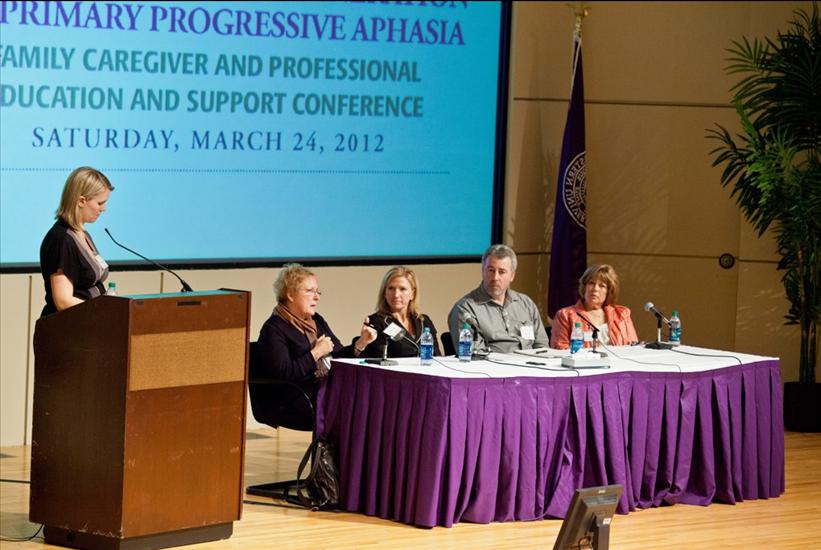One Voice: Caring for EVERYONE with PPA
The 2012 CNADC PPA Caregiver Conference was an important day for those of us with loved one’s battling PPA. We had the sharpest minds in the field educating us on how to help those we love the most. As the morning kicked off, my vending booth was prominently located and positioned side-by-side CNADC’s to help promote the Run4Papa campaign. My booth had 3 main exhibits: 1. A personal letter of endorsement from Dr. Marsel Mesulam 2. A computer with Run4Papa.com pulled up for attendees to view and learn more about THE CAUSE 3. The newly launched Running Shirt – an opportunity for EVERYONE battling PPA to have their loved one’s name on the back of my shirt for the Great Wall of China Marathon – a BIG HIT!
The conference exposure was heart-warming because I had the pleasure of meeting caregivers whose loved one’s were diagnosed with PPA. While there were plenty of new names and faces, there were plenty of people attending that were following THE CAUSE online through social media like Facebook and Twitter. On top of all that, the most emotional conversations (if I am allowed to be biased) took place when speaking with patients battling PPA, all of whom were enthusiastically encouraging the efforts of the Run4Papa campaign.
With 324 attendees, the conference was tailored to family caregivers as well as health care professionals. Dr. Marsel Mesulam, Director of the CNADC and the man who first identified PPA, graciously welcomed everyone to the conference. Following his introduction, a lecture on the state of PPA research and treatment by Northwestern physician and assistant professor of geriatrics was delivered by Dr. Diana Kerwin. Our keynote address on “Behaviors, Language and Communication” was presented by Dr. Geri Hall (from Banner Alzheimer’s Institute in Phoenix), who has lectured and published widely on behavioral interventions and communication strategies in dementia, specifically PPA. The morning session ended with an interactive Q & A session from a panel of doctors and PPA caregivers. This opportunity provided audience members the ability to ask questions ranging from medical opinions, to family member reactions about PPA as well as expectations down the line for caregivers. When all the questions had been asked and answered, we broke for lunch and gave attendees more time to mingle amongst the vendors at the conference.
During the afternoon, the CNADC team organized 12 different breakout sessions for members to attend. Here were some of the choices:
a) Newly Diagnosed, Now What? b) Understanding Genetics in PPA c) Responding to Behavior and Personality Changes in PPA d) When is it Time? Identifying Options and Making Transitions for Care.
My parents split the meetings above while I attended the Support for Family Caregivers and Exploring Creative Art Therapies sessions. The caregiver session was unbelievably emotional because everyone shared their unique personal story. In the same respect, it was extremely helpful listening to everyone and learning how each person/family copes and adjusts to an ever-changing lifestyle of caregiving. Even though this was my first caregiver group experience, I could see the instant impact our dialogue was having on the faces around the table. One caregiver whose wife was diagnosed with PPA within the past couple years said, “I didn’t think I needed to come here before, because to be frank, I was in denial about my wife. This year, I realized that was a mistake. I will continue to come every year moving forward and attend the support groups for help and advice in the future.”
Similarly, the creative art therapy session was equally informative yet surprisingly entertaining. Through hands-on classroom activities, we learned how art, music and movement therapy help people diagnosed with PPA by maintaining their sensory and motor skills. The behaviors included expressing our inner thoughts by drawing pictures on paper, using hand gestures to communicate our emotions, and singing along to improvised songs instructing us to repeat specific lyrics.
As the breakout sessions finished, everyone headed back to the lecture hall for the conclusion of the conference. My What would you do for THE CAUSE? video was being shown and looped for roughly 15 mins on the big screen as everyone took their seats. Dr. Jennifer Medina concluded the day with her speech on “Stress and Caregiving: Mindfulness as a Coping Tool.”
I was so proud to share this day with my parents, family caregivers, patients, experts in the field-and of course-the CNADC team. The conference is an excellent resource for families and people fighting against PPA who want to be a part of a special team dedicated to finding treatment and a cure for this brutal disease.
If you couldn’t make it this year for whatever the reasons, please don’t miss it 364 days from now.

